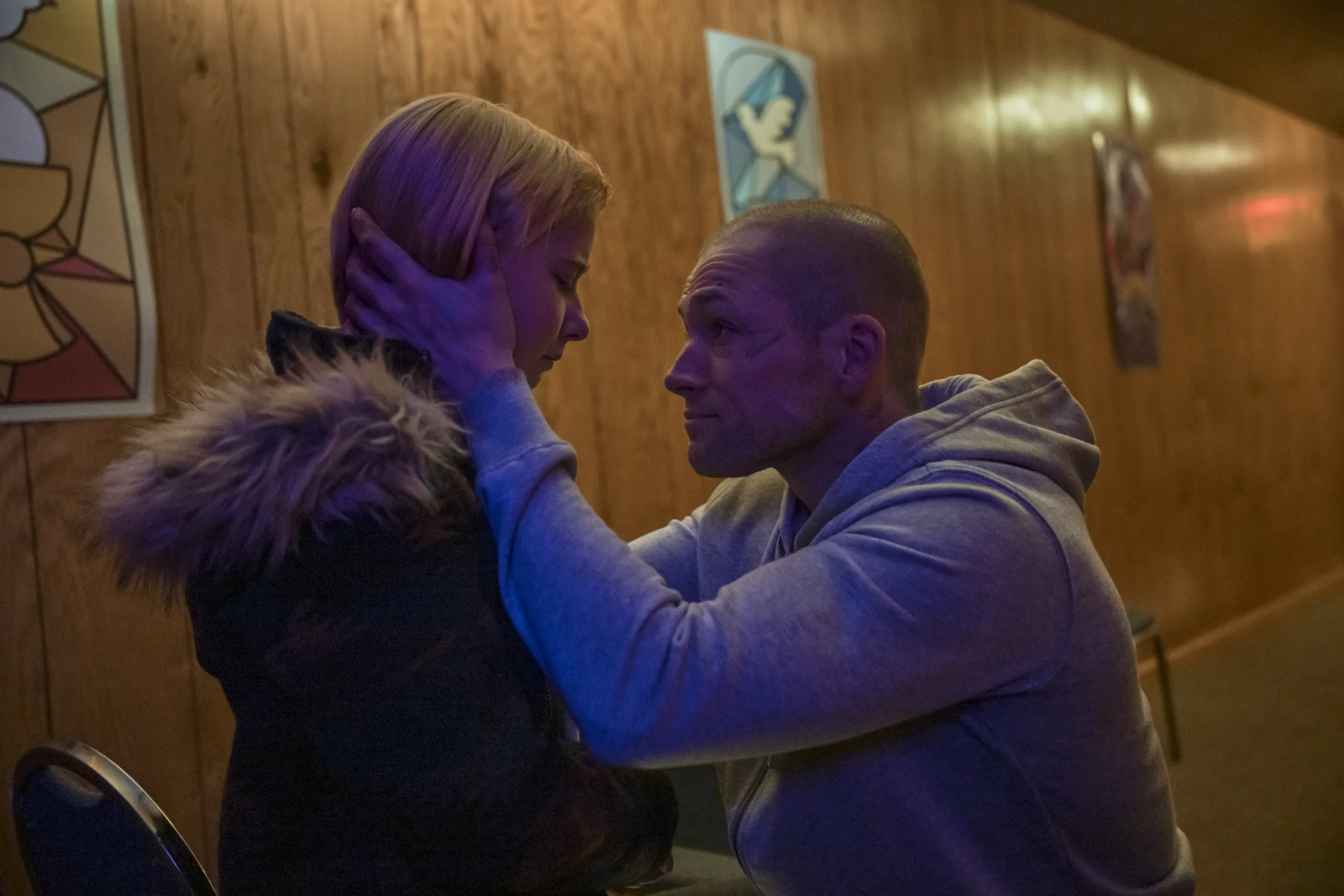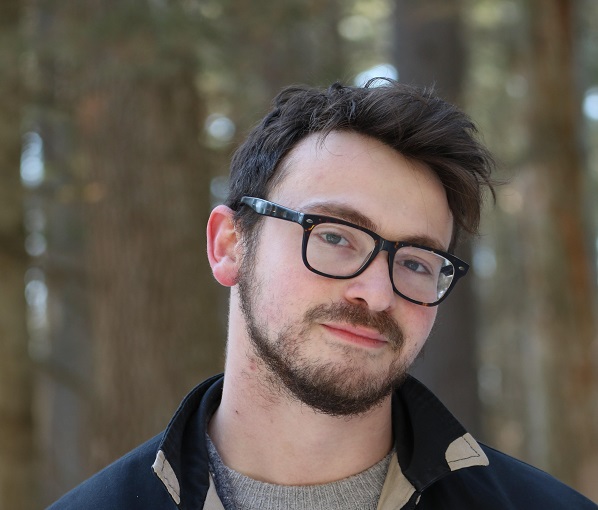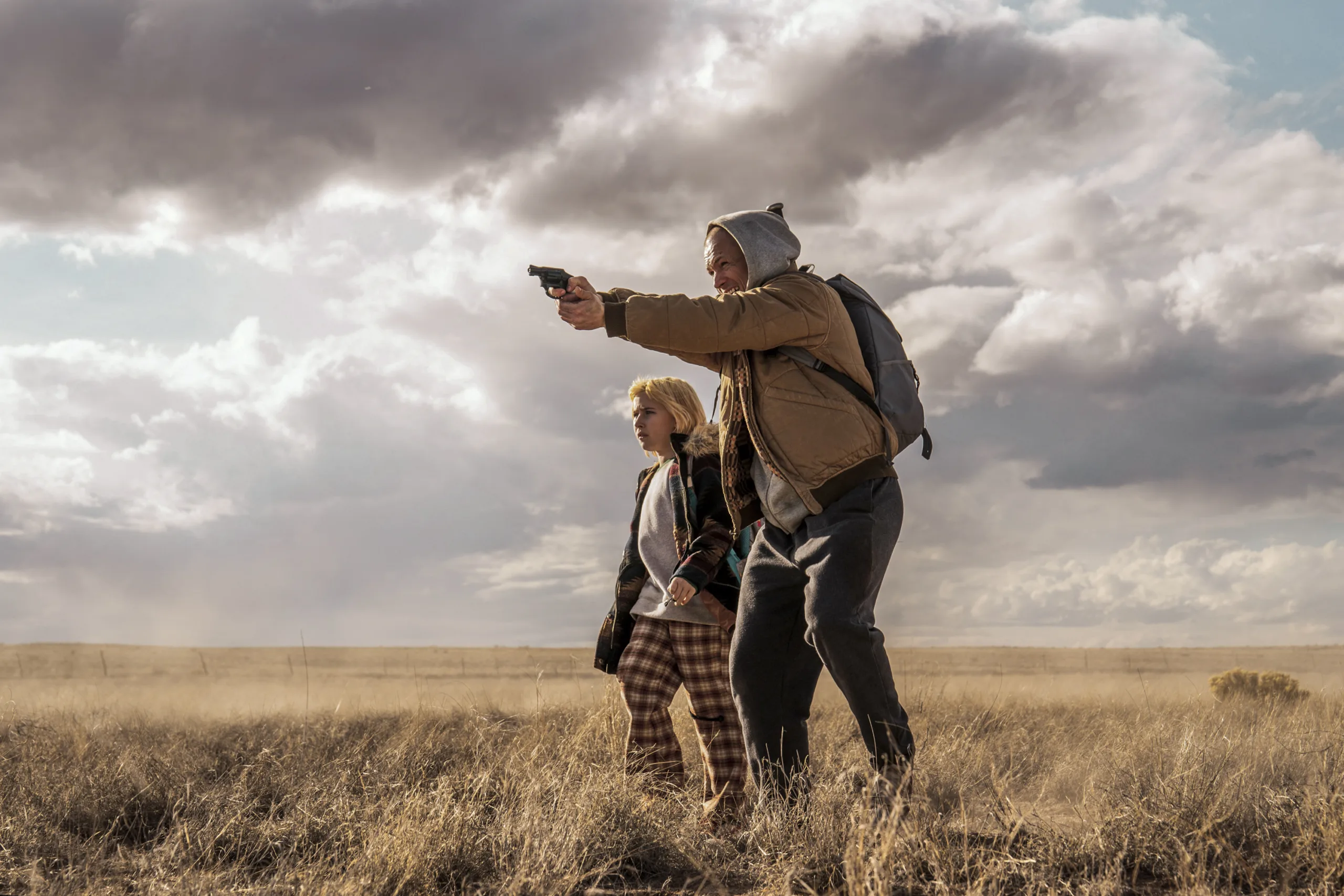Taron Egerton can be a tricky actor to pin down, and that’s exactly how he likes it. Since breaking out as a street-kid-turned-spy in “Kingsman: The Secret Service,” he’s perhaps most distinguished himself by disappearing into one role after another.
Whether channeling a crown prince of pop in the Elton John biopic “Rocketman,” or getting under the skin of a convicted drug dealer playing cat-and-mouse with a serial killer for crime drama “Black Bird,” the Welsh actor and singer clearly relishes a challenge. Those currently tuning into Egerton’s unsettling performance as an arson investigator on Apple TV+’s “Smoke,” his second collaboration with crime novelist Dennis Lehane, can attest as well to the way his career choices seem driven most by the desire to keep surprising audiences, taking on roles they wouldn’t have expected him to play and knocking them out of the park, one by one.
Now 35, he’s been a familiar face for just over a decade, and the most entertaining parts he’s played in that time—including a starry-eyed ski jumper in “Eddie the Eagle” and a slacker TSA agent called to heroism in “Carry-On”—have made clear his earnest charisma and fearsome versatility in about equal measure. Always, he conveys a certain restlessness on screen: the sense, even with his most charming characters, of something burning away under the skin.
The same can be said of his riveting work in “She Rides Shotgun” (opening in theaters Aug. 1), a tense and gritty crime-drama—adapted from the novel by Jordan Harper—that casts the actor as an ex-con on the run. In the lead role of Nate, who’s been marked for death by dangerous enemies he made in prison, Egerton plays a far more tragically flawed and desperate character than those presented to him in past film roles.
Fresh out of jail and driving a stolen car, Nate careens back into the life of his estranged 11-year-old daughter, Polly (Ana Sophia Heger), whom he knows is next on the hit list for a vicious gang that’s already exacted revenge by murdering Nate’s ex-wife, Polly’s mother. In hopes of saving his daughter, Nate flees with her, determined to outrun the corrupt cops and brutal enforcers on their trail. As they fight to survive, Polly is forced to grow up too quickly; and all the while, Nate struggles to reconnect with the daughter he’s always loved but hardly knows.
The role was a rich one for Egerton, who also produced “She Rides Shotgun,” in how it allowed him to both push himself as an actor and form a close bond with the 10-year-old actress playing his daughter, with whom his on-screen chemistry was especially crucial. While recently visiting Chicago with director Nick Rowland (“Calm with Horses”) for an advance Q&A screening hosted by Cinema/Chicago, Egerton sat down for an interview inside Bernard’s, a cocktail lounge on the second floor of the Waldorf Astoria Chicago.
In conversation, Egerton discussed “She Rides Shotgun,” the themes of fatherhood emerging from his recent roles, the actors he most admires, and the Werner Herzog documentary that he can’t live without.
This interview was edited and condensed.

Even before “She Rides Shotgun,” you’d been exploring crime fiction through your collaborations with Dennis Lehane, who developed both “Black Bird” and “Smoke.” Like Lehane, Jordan Harper writes brutal, hard-boiled stories, and I’m curious what draws you to working in this genre, if that’s been a conscious decision on your part.
I’ve never really thought about it before, and I really just respond to what I respond to. But as you were asking that, something occurred to me. I was dropped into the industry in an action film. I felt very much like a fish out of water. Throughout my 20s, I pined for projects that felt a little more sober, nuanced, and psychologically interesting. I’ve perhaps used the currency I have gained within work that’s quite action-based to segue slightly into a genre that’s more intellectually stimulating, perhaps more nuanced in terms of character.
I don’t know if that’s even true, but it’s what occurred to me when you were asking the question. I’ve wanted to try to find projects that are more challenging, and to play people that are not as accessible, perhaps, as the roles that I first became known for. Eggsy in “Kingsman,” “Eddie the Eagle,” “Rocketman” — these are all parts that are easy for you to love very quickly — and that were designed that way, right? That’s something I felt penned in by, after a while. The work I’ve been doing in recent years, with “Black Bird” and “Smoke,” has allowed me to enjoy playing with the expectation that you’re going to like me immediately.
I sensed that in the performance you give in “She Rides Shotgun.” With Nick, you’re playing this character tormented and trapped by the cycles he’s fallen into. He’s trying to break out of those behaviors, for his daughter’s sake, but he still harbors such darkness and rage.
I’m in my mid-30s now. While, obviously, I’m still a young man, I do think something’s happened in my life over the past couple of years. I’ve hit that first age-bar, where I’ve gone, “Oh, fuck — I’m no longer the puppy-ish young buck I was playing for many years. I can’t play that guy anymore, because I’m going to be 40 in a few years, and it’s going to start getting weird.”
Although this movie is, at its core, a simple story, I felt there was a lot between the lines of who Nate was, such as the inference of his history with his brother. And I always felt there was a suggestion that his brother might have been an overbearing presence in his life; you only see one image of them, very briefly, in the movie, and the body language is such that you can tell he’s this big, hulking figure. [laughs] The guy we got for that photo was a mixed martial artist, a really imposing guy.
The reason I mention that is because Nate is a character that, I feel, was always a follower. He was always a gang member, never a gang leader. He’s somebody who went with the flow and now realizes that he has lived a life not necessarily aligned with who he is, or who he wants to be.
Then comes this set of extraordinary circumstances that are of his own making, and of his own mistakes. He gets into a fight with a guy who tries to bully him into acting on the outside, and he kills a guy in prison shortly before his release; the gang knows it was him. Now, he’s in this situation where his daughter’s gonna die, and he’s trying to do one last good thing. I always felt the character was a dead man walking. I always felt that from the moment you meet him in the film, that you should have a sense he’s a man marked for death by the gang he was affiliated with, perhaps marked for death by fate as well. It doesn’t feel like he’s gonna make it out alive, but I enjoyed his regret. I enjoyed his conflict about who he is and what he’s done.
In a completely different universe. I suppose that’s something that I’ve been experiencing in my own life, where I’ve been reflective of my 20s and my journey so far, now having been a working actor for 10 years.
A dead man walking.
[laughs] They’re completely different situations! But there’s something of who he is that spoke to me, I suppose.
To that idea of him being marked, it’s how Nick appears in the eyes of his daughter that starts to matter most to him. Ana Sophia Heger, who plays Polly, was 10 years old when you were filming. I’m curious to ask you about that collaboration and being on the other side of this parent-child dynamic — which you’ve played before, but usually as the son.
It was very freeing, actually, because the shoot was about Ana, not about me. It sounds possibly like I’m signaling virtue; maybe, on some level, I am. But I felt, when we were making it, that it was really about her experience. That’s what was going to make or break the movie. That was highest-stakes.
When I was 15, I did a play in the art center in my hometown. In the grand scheme of things, it was a pretty local, communal affair, but to me it felt universe-expanding. I thought about that a lot when we were making this film, because she’s five years younger than I was then, and this was a movie with an actor she was at least partially aware of, through her parents. The stakes were that much higher.
Making it as much about her as possible was very freeing for me, and not entirely altruistic. And then you have the extraordinary sensibilities of this young actor, who is prodigious in her talents and quite wise beyond her years.
Was that clear from the start, in auditioning with her?
I’d seen a test of Ana on her own from the casting director, where she’d performed the scene where she’s on the phone with Park, and she gets very emotional, upset, and defensive. She is beginning to sense that her dad isn’t a bad guy, but she’s also seen this advert on TV and found out her mum’s dead, so she’s doing this incredible juggling act: doing as the TV is telling her, but being very conflicted about it, because she does not believe her father has killed her mum.
I watched her do that, and she had such an innate emotional understanding of the conflict that the character was going through. It’s nothing you can teach. It’s a level of emotional intelligence that is extraordinary—and, dare I say it, not to be disparaging, but there are plenty of successful adult actors who do not have that. It’s very exciting when you find a 10-year-old who has it.
Of course, we did a screen test together. I said, at the start of the test, “It’s okay to be nervous. We all get nervous. I’m a bit nervous, too.” And she said, “I am nervous, but I’m ready.” And that is who she is. She’s amazing. She still gets nervous, she’s human, and we still had to protect her, but we needed somebody who could step on set and claim her space. Ana does that.
In preparation for this role, you reached out to actors you admired and asked them to recommend films in the same key as what you were searching for with this character. Gary Oldman said to watch Dustin Hoffman in “Straight Time” and Gene Hackman in “The Conversation.” Stephen Graham told you to watch Oldman in “State of Grace.” Learning this led me to think about the actors you’ve met across your career, to ask about the mentors or role models who’ve guided you at different stages.
There are actors who have been very kind to me, and very paternal at the times I’ve worked with them. On the first “Kingsman,” Colin Firth was absolutely that for me. There is one actor who’s somebody I do have a very active relationship with, who’s somebody I do look up to, and that is Stephen Graham. He’s an actor I turn to and look for advice from, whom I admire greatly.
He’s not the kind of guy who would wear the mantle of a mentor very lightly; that’s not really who he is, but he does see himself in a big-brother role in my life. And I think we all want that. We all need to look to examples of people we want to be like or emulate, whose talent we admire and covet. That’s why representation is important, of course.
Stephen is somebody I’ve just loved for a very long time, a real actor’s actor. Right now, with “Adolescence,” the world is becoming incredibly aware of who he is, possibly in a broader way than it ever has. But the industry has known him to be one of the best there is, for a long time.
I’d be remiss not to ask you about Ray Liotta, whom you shared scenes with in “Black Bird.”
That was a very emotional time for me, for a number of reasons. Ray and I, for the short time we worked together, developed a very special bond. I still feel that the scenes he and I shared together in that show are some of the best acting I’ve done. I was very struck by him as a man and as a talent. It was sad for me for a number of reasons. Our relationship was blossoming and then he passed unexpectedly.
I think he absolutely would have been in “Smoke.” He’d expressed the desire to be in it, and Dennis had every intention of putting him in it. I don’t know who he would have been, but he would have been in the show. I know that, because Dennis has said that, and so that was sad as well. I also have my own private fatherhood stuff, you know? I think I am quite responsive to any kind of paternalistic figure that has presented itself in my life. I found it emotional, and I was very emotional promoting the show, because of Ray’s passing. Fatherhood is a theme that I am clearly drawn to. It seems to be cropping up quite a bit in what I do.
He was a massive talent, and the scenes you two shared in “Black Bird” are so raw and powerful. Thank you for sharing that experience.
I really do appreciate that, thank you.
“She Rides Shotgun” is a project you produced, as you did “Black Bird” and “Smoke.” What is it like to work as both actor and producer in getting a film like this made?
One of my demons is that I have probably a larger sense of imposter syndrome than is healthy. [laughs] When I was sent the script for this, I felt it was something that I wasn’t going to get. And actually, now, in hindsight, if I’m honest, it probably got made because I wanted it to happen.
This is the first time in my career where I feel like I’ve been the real engine behind something getting made. Through the grace of Chris Slager of Fifth Season, Brad Weston of Makeready, and of course [director] Nick Rowland, they were very comfortable and welcoming with me being a central part of the creative process and involved in all aspects of it.
It’s the first time I’ve ever really had any insight into the finances of production. I’ve never really bothered myself with that before, and I only mention it to give a sense of how much I really felt like a producer. I don’t know, in the projects that I’ve had executive producer credits on, that I always felt like an executive producer. With this, I really feel like one. I feel like I’ve been inside it, and I’ve enjoyed it.
Nick and I are also the same age, so that feels different. That’s a very different dynamic to anything I’ve experienced before, and Nick is intensely collaborative, inquisitive, and interested in all perspectives. It’s a Nick Rowland film, but it does feel a bit like my baby as well. And I’m intensely proud of it for a number of reasons.
I’ve very much enjoyed being able to use what currency or power I have to bring something into existence that is to my taste, that feels very raw and human. Nick says of himself that he doesn’t think of himself as an intellectual filmmaker, and I don’t think of myself as an intellectual actor, but I know that I love things that are undeniably emotional and human. I love things that allow me to explore what I feel manhood is, frankly — not the tropes but the facets of what I’d describe, those feelings of vulnerability, of not being afraid to show your doubt, fear, or insecurity. I really enjoyed doing that with the character of Nate — who in some ways this genre would have archetypally made to be more stoic and unassailable.
We’ve run out of time for this, so I’ll just leave you by saying I was delighted to learn recently—via Letterboxd—that we have a favorite film in common: Werner Herzog’s “Grizzly Man,” which I find impossibly haunting and beautiful no matter how often I watch it.
[grinning] Oh my god, I must have seen “Grizzly Man” 15 to 20 times, and there’s just something about it. It’s Werner, I think. He casts a spell, and it’s unquantifiable, and it has an intangible quality about it. I love, love, love that movie. It’s mythic and spiritual and weird, but it’s also got this character whose ego is taking him to such a place of toxicity and delusion. But I just find it endlessly fascinating. It’s lovely to meet someone else who’s passionate about it… Funnily enough, I bumped into Kate Mara on the street the other day, and she told me she’s just shot a film with Werner, [“Bucking Fastard,”] where she’s playing twins opposite her sister, Rooney. How cool is that? I’m so excited to see it.
“She Rides Shotgun” is in U.S. theaters Aug. 1, via Lionsgate.












